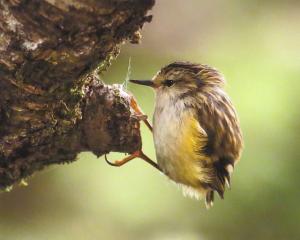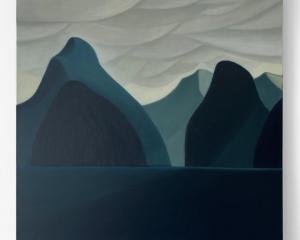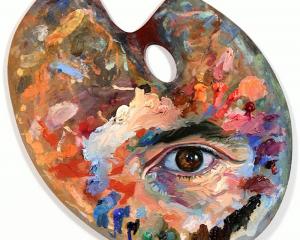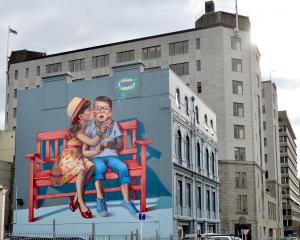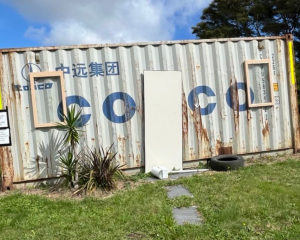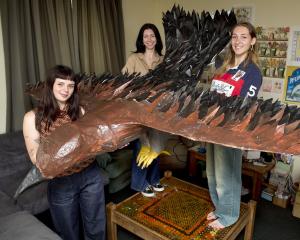Bluff-based Dunedin poet Cilla McQueen is about to show a series of art works that might surprise and puzzle. She tells Rebecca Fox about overcoming her technology phobia.
Explaining her latest artworks is more difficult than talking about writing, Cilla McQueen says.

Speaking from her "chaotic'' study with its views over Bluff Harbour, New Zealand's 2009-11 poet laureate is about to test the waters to see what people think of her latest work with the exhibition "Frolics: Imaginary Music''.
In a departure from her preferred pen or pencil to paper way of working, McQueen, who was born in England and came to New Zealand as a child, has taken to the computer.
"It's a medium I know nothing about. I'm actually a bit of a technophobe.''
Her iMac - "it's lovely'' - was mostly used as a glorified typewriter, the world of social media a mystery to her, until she discovered she could draw on it too.
"I'm using this amazing technology ... to produce illogical and intuitive works.''
Why, you may ask?
"Just because. I have no theoretical base.''
They are an extension of last year's exhibition of "music'' scores, taking it a step further. The Turnbull Library was in the process of acquiring some of her handmade scores, calling them "intuitive scores'', which she liked.
"They link with sound in my mind. I hear what I see. It makes it delightfully fun.
"I use serendipity. My mind is alert to what I can create.''
Gallery owner Brett McDowell said he was enamoured of the almost primitive computer look of the series of 12 works.
For McQueen, it has been a challenge as she is working in a language she is unfamiliar with but is not afraid of.
She does not expect she will become any better with technology as a result.
"It's really interesting and amazing as there is a huge endless well of ideas.''
While best known for her poetry - she has published 14 volumes, has won the New Zealand Book Award for poetry three times and held the University of Otago Burns Fellowship twice - she has always turned to art when not writing.
"If I'm not writing as fluently as I'd like to, I'll turn to it.
"I go between writing and my computer.''
Her multi-media art work started as a sideline but had become an alternative to the English language as a way of expressing herself.
"The language of line and colour can be seen to adopt a poetic way. It's another way to convey ideas.''
As the ideas arose, she followed them. She listened to her "interior'', allowing strange thoughts, colours and shapes to "come out into the world''.
"I'm not in charge of receiving [the ideas]. The really interesting ideas come from somewhere.
"It's very much at the tips of my fingers. I draw what I see, bringing the ideas in my head out in another way than written language.''
Exhibiting her works was a way to discover if her works meant anything to anyone else.
Reaction so far had ranged from the dismissive to musicians who got it and were keen to make music from them.
"They are scores for ideas, scores for imagining music.''
Despite this, there is still no greater satisfaction than creating a poem which is new to the world, she said.
"It's satisfying in a different way.''
Using technology was less personal than her preferred way of working with pen or pencil, she said.
"Its lovely to feel connected to the world.''
Although when she printed her works out on to paper, they were the very first prints "in the world''.
Living and working in Bluff provided a beneficial isolation for an artist, she believed.
She kept in touch with colleagues through email but otherwise worked without interruption or influence from others.
"I love being in Bluff.''
A recent trip to Auckland for its writers' festival to read from her recently released memoirs In A Slant Light: A Poet's Memoir resulted in a case of "culture shock''.
"In Bluff, there are few cars unless it's the oyster festival so to be in nose-to-tail traffic is like being in a different country.''
Her memoirs, like her art work, was putting herself out there to see if anyone else could relate to her experiences.
Writing the book was a way to "exorcise her brain'' to see how far back she could remember and how clear those memories were.
"It was a very good exercise. It was good to look back on my life.''
Not one to lay bare her dramas, she did not dwell on the sadnesses in her life.
"It is outweighed by the huge joy in living. I love life.''
The works to be exhibited were "joyful'' and a celebration of what is possible, she said.
They were also an example of her never-ending keenness to learn, even at the age of 67.
"I continue to be astonished by what we don't know and how small the world is.''
To see
‘‘Cilla McQueen - Frolics: Imaginary Music'', May 27-June 16, Brett McDowell Gallery.



